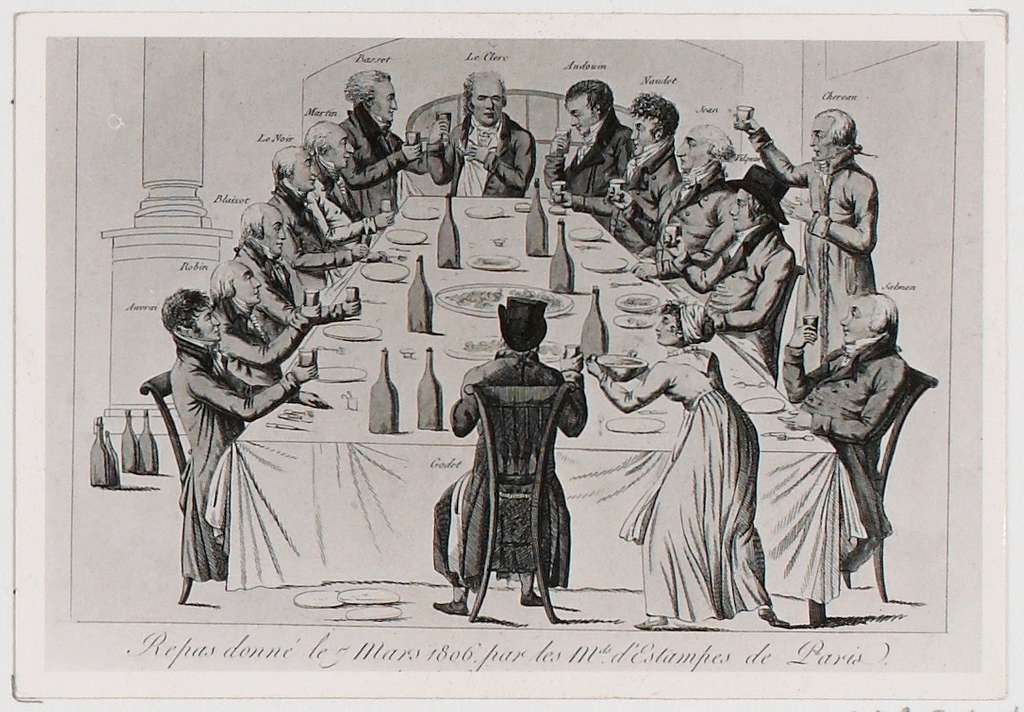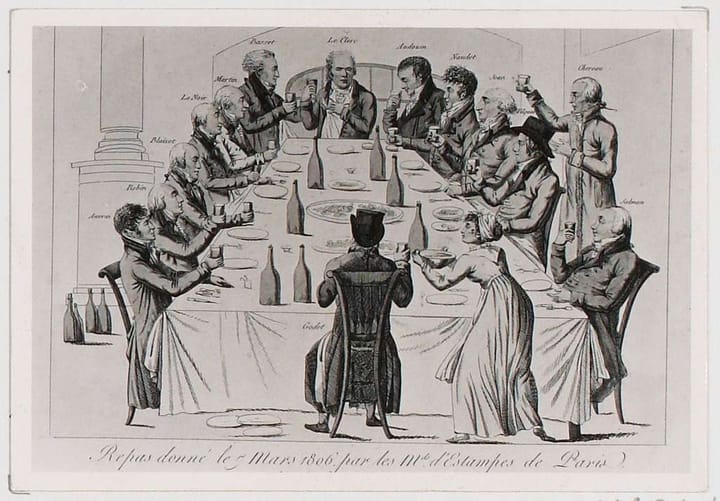Comment ne pas faire d’impair lors d’un dîner chez des Français

Vous êtes invité(e)s à dîner chez des Français ? Félicitations ! Vous vous apprêtez à vivre une expérience presque sacrée… mais attention, quelques règles tacites s’imposent pour éviter les faux pas (ou l’incident diplomatique).
D'abord, sachez qu’un dîner chez les Français ne commence jamais à 18h comme aux États-Unis. L’heure d’invitation tourne autour de 20h ou 20h30, rarement avant.
À Paris, en région parisienne, et dans le nord de la France, la ponctualité est de mise. En revanche, dans le sud, on a tendance à considérer le quart d’heure de retard comme une marque de distinction.
Ne venez pas les mains vides :
Un petit bouquet de fleurs (évitez les chrysanthèmes, associés aux cimetières), une boîte de bons chocolats ou une bouteille de vin feront toujours plaisir. On évite de ramener son propre plat à moins d’y avoir été invité expressément.
Avant le repas, place à l’apéritif — ou « l’apéro » pour les intimes. C’est le moment convivial par excellence, où tout le monde se détend, y compris les enfants (avec du jus d’orange, rassurez-vous). On grignote des chips, des olives, de la tapenade, parfois même des petites verrines chic. En vérité, l’apéro est parfois si copieux qu’il remplace l’entrée.
Le dîner commence rarement avant 21h30, surtout entre adultes. Les enfants, eux, mangent souvent avant et disparaissent mystérieusement au moment de passer à table (non, ce n’est pas une tradition, c’est une stratégie).
Côté organisation, les maîtres de maison s’assoient généralement au centre de la table. Et si vous pensiez vous asseoir là où il reste une chaise libre… eh bien, non. Il y a tout un protocole : on alterne hommes et femmes, on place les aînés à droite des hôtes, les moins âgés à gauche, et les plus jeunes ou les célibataires vers les extrémités. Même en famille, la règle reste (plus ou moins) respectée.
Traditionnellement, les hommes servent le vin (oui, encore un reliquat d’un monde un peu ancien). Mais de plus en plus, chacun se sert, surtout si la table est grande… et que la bouteille est trop loin.
Le savoir-vivre à table :
- Les mains sur la table, oui, mais poings fermés, pas les coudes.
- On mâche bouche fermée, évidemment.
- On se tient droit, du moins au début du repas.
- Et surtout, on ne commence à manger que lorsque tout le monde est servi et que la maîtresse de maison débute (sauf si cette dernière vous donne l’autorisation d’entamer votre plat, en disant par exemple : allez-y, tant que c’est chaud).
Les sujets sensibles (politique, religion, société…) ne sont pas tabous — bien au contraire. Ils surgissent souvent après le fromage et donc avant le dessert quand tout le monde est détendu.
Les débats peuvent être vifs, passionnés, animés, mais ils se terminent (presque) toujours dans la bonne humeur. On peut ne pas être d’accord sans se fâcher — une vraie discipline nationale.
Dîner chez des Français, c’est donc bien plus qu’un simple repas — c’est un moment de partage, de plaisir… et parfois, de performance sociale. Mais ne paniquez pas : si vous venez avec le sourire, un bon vin et un peu de curiosité, vous serez toujours le ou la bienvenue.
TRADUCTION :
How Not to Make a Faux Pas at a French Dinner Party
You've been invited to a French dinner party? Congratulations! You're about to experience something almost sacred... but beware: a few unspoken rules apply if you want to avoid a blunder (or worse, a diplomatic incident).
First of all, be aware that a French dinner never starts at 6 p.m. like in the U.S. The typical invitation time is around 8:00 or 8:30 p.m., rarely earlier.
In Paris, the greater Paris area, and generally in the north of France, punctuality is expected. On the other hand, in the south, being fashionably fifteen minutes late is often seen as a charming custom.
Don’t show up empty-handed:
A small bouquet of flowers (but avoid chrysanthemums — they’re for cemeteries), a box of nice chocolates, or a bottle of wine will always be appreciated. Avoid bringing your own dish unless you've been specifically asked to — your famous vegan chili might not be part of the plan.
Apéritif: A French Institution
Before dinner begins, it’s time for the apéritif — or “apéro” if you want to sound cool. This is the ultimate social moment, when everyone starts to relax — even the kids (don’t worry, they’ll be sipping orange juice). Chips, olives, tapenade, sometimes even fancy little verrines... Apéro snacks can be so generous that they sometimes replace the starter altogether. And no one complains.
Dinner rarely starts before 9:30 p.m., especially among adults. Children usually eat earlier and then mysteriously vanish at dinnertime (not a tradition, just a clever survival tactic).
As for seating, the hosts usually sit in the center of the table. And if you thought you'd just sit wherever there's a free chair... think again. There’s a whole protocol: men and women are alternated, elders sit to the right of the hosts, the slightly younger to the left, and the youngest or singles go at the ends of the table. Yes, even in families, this is more or less observed.
Traditionally, men pour the wine (yes, a charming leftover from an older world). But nowadays, people often serve themselves — especially if the table is long and the bottle’s out of reach.
Table Manners 101:
- Keep your hands on the table, fists gently closed, and no elbows.
- Chew with your mouth closed — obviously.
- Sit up straight, at least until the second glass of wine.
- And above all, don’t start eating until everyone has been served and the hostess has begun — unless she invites you to start by saying something like “Go ahead, while it’s hot.”
Let's Talk About... Everything
Hot topics like politics, religion, and society? Not taboo at all — quite the opposite. They often emerge after the cheese (and before dessert), once everyone is nice and relaxed.
Debates can get passionate, animated, even loud — but they (almost) always end in good spirits. In France, it’s possible to disagree without getting angry — it’s practically a national sport.
🍷 In conclusion: Dinner at a French home is much more than just a meal — it’s a moment of sharing, enjoyment... and sometimes, social performance. But don’t panic: if you show up with a smile, a good bottle of wine, and a bit of curiosity, you’ll always be welcome.



